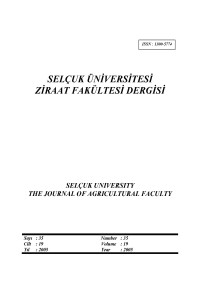Effects of Different Organic Manures and Leonardıte on Soil Properties and Growing of Maize Plant (Zea Mays L.)
Öz
The study was conducted to determine the effects of urban waste compost, cattle manure, chicken manure and leonardite on some soil properties and growing of maize (Zea mays L.) under greenhouse conditions. A sandy clay loam soil was used in the experiment. Urban waste compost, chicken manure and leonardite were applied to each soil in pots (oven dry basin, contained 3000 g of the soil), at the rates of equivalent to 0-5-10 t ha-1 (% 0.0-0.2-0.4) and cattle manure was applied at the rates of equivalent to 0-10-20 t ha-1 (% 0.0-0.4-0.8). The results showed that the soil properties and growing of maize (Zea mays L.) were affected by the types and dose of the organic manures. The highest soil aggregate stability and field capacity values were 17.00, 17.28 in the second doses of leonardite and the ratio of dispersion was 84.15 % in the first dose of chicken manure, respectively. The second dose of leonardit to improve soil properties was more effective than the other applications. The highest fresh leaf and root weight were 56.00 g pot-1 and 8.96 g pot-1, respectively. The highest dry leaf and root weight were 8.61 g pot-1 and 2.62 g pot-1, respectively. The highest (64.36 cm) plant tall was obtained with the application rate of chicken manure 1 tonnes per hectare. The first and second doses of chicken manure on growing of maize was more effective than the other applications.
Anahtar Kelimeler
Maize organic manure leonardite yield components soil properties.
Değişik Organik Gübreler ve Leonarditin Toprak Özellikleri ve Mısır Bitkisinin (Zea Mays L.) Gelişimi Üzerine Etkileri
Öz
Bu araştırma, sera şartlarında çöp komposttu (ÇK), sığır gübresi (SG), tavuk gübresi (TG) ve leonardit (L) uygulaması-nın toprak özellikleri ve mısır (Zea mays L.) bitkisinin gelişimi üzerine etkilerini belirlemek amacıyla yapılmıştır. Çalışma saksı denemesi şeklinde planlanmış olup, her bir saksıya fırın kuru ağırlık esasına göre 3 kg kumlu killi tın toprak doldurulmuş, bu saksılara ÇK, TG ve L 0-500-1000 kg da-1 (% 0.0-0.2-0.4) ve SG 0-1000-2000 kg da-1 (% 0.0- 0.4-0.8) hesabıyla ilave edil-miştir. Araştırma sonuçları kullanılan organik gübrenin çeşidi ve dozlarının toprak özellikleri ile mısırın gelişimini etkilediğini göstermiştir. En yüksek agregat stabilitesi ve tarla kapasitesi değerleri L’in ikinci dozunda, en yüksek dispersiyon oranı değeri TG’sinin birinci dozunda sırasıyla; % 17.00, % 17.28 ve % 84.15 olmuştur. Toprak özelliklerini iyileştirmede L’nin ikinci dozu diğer uygulamalardan daha etkili olmuştur. En yüksek taze yaprak ve kök ağırlıkları sırasıyla 56.00 g saksı-1 ve 8.96 g saksı-1, en yüksek kuru yaprak ve kök ağırlıkları sırasıyla 8.61 g saksı-1 ve 2.62 g saksı-1 bulunmuştur. En yüksek bitki uzunluğu (64.36 cm) TG’nin birinci dozunda ölçülmüştür. Mısır bitkisinin verim unsurları ile boy uzunluğu üzerine en fazla etkiyi TG’nin birin-ci ve ikinci dozları yapmıştır.
Anahtar Kelimeler
Mısır organik gübre leonardit verim unsurları toprak özellikleri
Ayrıntılar
| Birincil Dil | İngilizce |
|---|---|
| Konular | Toprak Bilimi ve Ekolojisi |
| Bölüm | Araştırma Makalesi |
| Yazarlar | |
| Yayımlanma Tarihi | 25 Nisan 2005 |
| Gönderilme Tarihi | 1 Ocak 2005 |
| Yayımlandığı Sayı | Yıl 2005 Cilt: 19 Sayı: 35 |
Selcuk Journal of Agriculture and Food Sciences Creative Commons Atıf-GayriTicari 4.0 Uluslararası Lisansı (CC BY NC) ile lisanslanmıştır.


